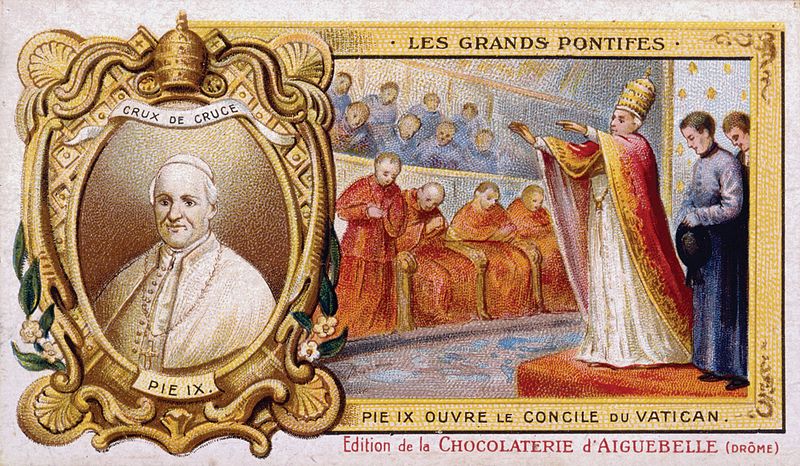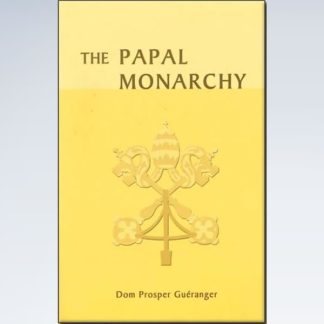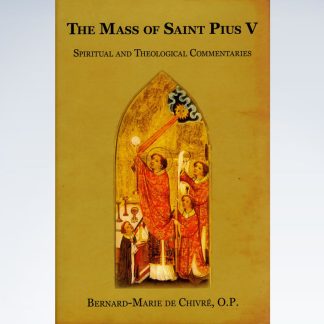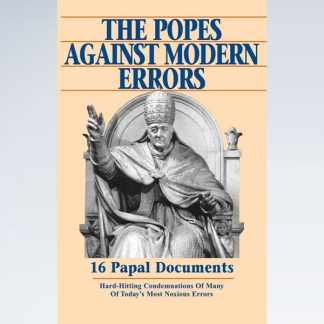

“For the Holy Ghost was not promised to the successors of Peter that by His revelation they might disclose new doctrine, but that by His help they might guard sacredly the revelation transmitted through the apostles and the deposit of the Faith, and might faithfully set it forth.” — Vatican I Session 4, Chapter 4: On the infallible teaching authority of the Roman pontiff .
“Moreover, that the supreme power of teaching is also included in the apostolic primacy, which the Roman Pontiff, as the successor of Peter, Prince of the Apostles, possesses over the whole Church, this Holy See has always held, the perpetual practice of the Church confirms, and also (Ecumenical Councils have declared, especially those on which the East, with the West, met in the union of faith and charity.
For the Fathers of the Fourth Council of Constantinople, following in the footsteps of their predecessors, gave forth this solemn profession : 1 The first condition of salvation is to keep the rule of the true faith. And be cause the sentence of our Lord Jesus Christ can not be passed by who said : “Thou art Peter, and upon this Rock I will build my Church ” (St. Matt, xvi. 18), these things which have been said are approved by events ; because in the Holy Apostolic See the Catholic religion and her holy and well-known doctrine has always been kept undefiled. Desiring, therefore, not to be in the least degree separated from the faith and doctrine of that See, we hope that we may deserve to be in the one communion, which the Apostolic See preaches, and in which is the entire and true solidity of the Christian religion. (1)
And with the approval of the second Council of Lyon, the Greeks professed that the Holy Roman Church enjoys supreme and full primacy, and preeminence over the whole Catholic Church, which it truly and humbly acknowledges that it has received, with the plenitude of power, from our Lord himself, in the person of blessed Peter, Prince or Head of the Apostles, whose successor the Roman Pontiff is, and as the Apostolic See is bound before all others to defend the truth of faith, so also if any questions regarding faith shall arise, they must be defined by its judgment. (2) Finally, the Council of Florence defined, (3) ‘ that the Roman Pontiff is the true Vicar of Christ and the Head of the whole Church, and the Father and Teacher of all Christians ; and that to him, in blessed Peter, was delivered, by our Lord Jesus Christ, the full power of feeding, ruling and governing the whole Church’ (St. John xxi. 15, 17).
“To satisfy this pastoral duty, our predecessors ever made unwearied efforts that the salutary doctrine of Christ might be propagated among all the nations of the earth, and with equal care watched that it might be preserved genuine and pure where it had been received. Therefore, the bishops of the whole world, now singly, now assembled in synod, following the long-established custom of churches, (4) and the form of the ancient rule, (1) sent now to this Apostolic See of those dangers especially which sprang up in matters of faith, that there the losses of faith might be most effectually repaired where the faith can not fail. (2)
“And the Roman Pontiffs, according to the exigencies of times and circumstances, sometimes assembling (Ecumenical Councils, or asking for the mind of the Church scattered throughout the world, sometimes by particular synods, sometimes using other helps which Divine Providence supplied, defined as to be held, those things which, with the help of God, they had recognized as conformable with the Sacred Scriptures and Apostolic Traditions. For the Holy Spirit was not promised to the successors of Peter that by his revelation they might make known new doctrine, but that by his assistance they might inviolably keep, and faithfully expound, the revelation or deposit of faith delivered through the apostles. And, indeed, all the venerable Fathers have embraced, and the holy orthodox Doctors have venerated and followed their apostolic doctrine; knowing most fully that the See of holy Peter remains ever free from all blemish of error, according to the divine promise of the Lord our Saviour made to the Prince of His disciples ‘I have prayed for thee that thy faith fail not, and when thou art converted, confirm thy brethren’. (3) (St Luke xxii. 32).
“This gift, then, of truth and never-failing faith was conferred by heaven upon Peter, and his successors in this chair, that they might perform their high office for the salvation of all ; that the whole flock of Christ, kept away by them from the poisonous food of error, might be nourished with the pasture of heavenly doctrine ; that the occasion of schism being removed, the whole Church might be kept one, and, resting on its foundation, might stand firm against the gates of hell.
“But since in this very age in which the salutary efficacy of the apostolic office is most of all required, not a few are found who take away from its authority, we judge it altogether necessary solemnly to assert the prerogative which the only begotten Soc of God vouchsafed to join with the supreme pastoral office.
“Therefore, faithfully adhering to the tradition received from the beginning of the Christian faith, for the glory of God our Saviour, the exaltation of the Catholic religion, and the salvation of Christian people, the Sacred Council approving, We teach and define that it is. a dogma divinely revealed : That the Roman Pontiff, when he speaks ex cathedra — that is, when, in discharge of the office of Pastor and Doctor of all Christians, by virtue of his supreme apostolic authority, he defines a doctrine regarding faith or morals to be held by the Universal Church, by the divine assistance promised to him in Blessed Peter, is possessed of that infallibility with which the divine Redeemer willed that His Church should be endowed, for defining doctrine regarding faith or morals; and that, therefore, such definitions of the Roman Pontiff are irreformable (1) of themselves, and not from the consent of the Church.”
The whole structure of the Church, its government and mission, are thus indissolubly connected with the sacrament of Holy Orders. ” What a complication of graces is implied in ordination,” says Faber, “and then, also, what a magnificence of powers ! It is a manifold Sacrament. Its unity is a three-fold unity in Bishops, Priests, and Deacons—a shadow of unutterable divine grandeurs ! It is, as it were, the sacred vessel in which the other six Sacraments are kept, and out of which they radiate their glory and their life.” (2)
(1) Pope Pius VL, Brief Super SolUitat*, 28, Nov., 1786.
(2) Acta of Gen. Council of Lyons (a.d. 1274) ; Labbe, Councils, Vol. XIV., p. 318.
(8) Ep. vii. of Pope Nicolas L to the Emperor Michael (aj. 858). IbM VoL IX, ppm, 1570.
(1) Formula of St Hormisdas, subscribed by the Fathers of the 8th Gen. Council, Constantinople (a.d. 869). Labbe’s Councils, Vol. V., pp. 588, 622.
(3) Acta 14th Gen, Council, 2d of Lyons (a.d. 1274). Ib., Vol. XTV., p. 512.
(8) Acta 17th Gen. Council (Florence, 1488). Ib., VoL XVIII., p. 526.
(4) Ep. St Cyril of Alexandria to Pdjw St. Oelestine I. (ajd. 422. E. Paris, 1688 VoL VI., pan 2, p. 36.)
(1) St. Innocent I., Rescript to Council of MUevii (a.d. 402). Labbe, lb. Hi., p. 47.
(2) St Bernard, Ep. to Pope Innocent n., 1280. Epiai 191. Opera (Paris, 1743) Vol. IY., p. 433.
(8) Acts 6th Gen Council, a.d. 680. Abb6, Vol. VII., p.
(1) In the words used by Pope Nicolas L (ante), and in the Synod of Qucdlinbnrg1 a-D. 1085, ” it is allowed to none tc revise its judgment and to sit in judgment upon what has judged.” Labbfi, Vol. XII., p. 679.
(2) The Precious Blood, p. 292.
Sources: The Teachings of The Holy Catholic Church Embracing Her Dogmas, Sacraments And Sacramentals,
By Rev. S.B. Smith, DD.
With The Teachings And Acts of Her Divine Founder, Our Saviour And His Successor Saint Peter, By Father Francis DeLigney.
Can a Heretic be a Valid Pope of the Roman Catholic Church?
No. The Papal Bull Cum ex apostolatus officio of Pope Paul IV teaches that: if anyone was a heretic before the Papal election, he could not be a valid pope, even if he is elected unanimously by the Cardinals. Canon 188.4 (1917 Code of Canon Law) teachers that : if a cleric (pope, bishop, etc.) becomes a heretic, he loses his office without any declaration by operation of law.
“Though we, or an angel from heaven, preach a gospel to you besides that which we have preached to you, let him be anathema. As we said before, so now I say again: If any one preach to you a gospel, besides that which you have received, let him be anathema.” — Galatians 1:8-9
Related: Bergoglio’s continued attack on Catholics and the liturgy

VIRGÓ SACRÁTA is a Christian mission-driven online resource and shop inspired from the beauty of Catholic faith, tradition, and arts. Our mission is to “Restore All Things to Christ!”, in continuing the legacy of Pope St. Pius X under the patronage of the Blessed Virgin Mary. “Who is she that cometh forth as the morning rising, fair as the moon, bright as the sun, terrible as an army set in battle array?” O Mary, conceived without sin, pray for us who have recourse to Thee.





